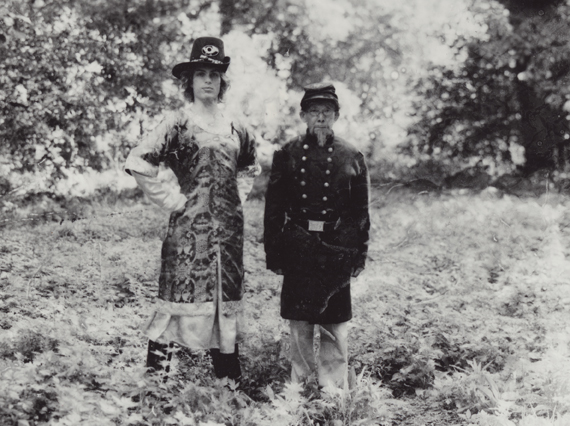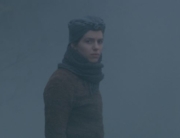The Battle of Pussy Willow Creek is a picture- and letter-perfect send-up of such serious treatments of history that fill cable and public television. It specifically parodies Ken Burns’ epic, the ever repeating The Civil War series from 1990. Zinging its target more formally than a Christopher Guest satire, the behind-the-camera creative team assumes fictional identities as thorough and detailed as the eccentric 19th century “heroes” of this key battle that was suppressed by an embarrassed government. Their cause is now championed by a cadre of eclectic “experts” brought together by faux documentarian Grace A. Burns. (Wendy Jo Cohen wrote and directed this clever debut feature).
The comically convoluted biographies of those involved in the fateful 1863 clash that saved Washington, D.C. are just part of the fun. The misbegotten Thirteenth Rhode Island Volunteer Infantry is led by cross-dressing Colonel Jonathan Franklin Hale (Matthew Ludwinski), who found true love with a Southern cadet at West Point and opium in a Confederate prison theater production. (The dastardly British mercenaries, led by his ex-lover, seem like a wink to Kevin Willmott’s comparable mockumentary C.S.A.: The Confederate States of America.) He was assisted by a most unorthodox team: Li Shao-zu (Feng Tien Lui), a general from the Chinese emperor’s wars-turned-laundry entrepreneur; ex-slave and intrepid inventor Elijah Swan (Barron A. Myers); and revengeful prostitute-turned-drummer boy amputee Rowena Harris/Candie Apple/“Poison” Apple/Nicholas Brody (Cheri Paige Fogleman).
With an unctuous narration by J. Winston Barrymore (Christopher Lukas), their stories are related by ultra earnest “experts,” whose biases for neglected minorities are made entertainingly clear through their outfits and background settings, let alone for their far-fetched interpretations of the “facts”: including distant Swan descendant Raashida Brinks (Emilie Bonsant); Sheba LeJeune (Shelley McPherson), chronicler of prostitutes; Roger McEntyre (Tim Cusack), a professor at “Penn State Scranton,” historian of gay soldiers and tolerance educator; and eye-patched Vietnam War vet Timothy Winchell (John Redmond), who colorfully provides the military perspective. (As someone who has been in a feminist history book group for more than 30 years, I found all the “authors” particularly amusing.)
What makes their cases so spot-on convincing is the marvelous visual “evidence” collected by director of photography Matthew Howe and the “archival” photographs created by still photographer Eric Antony Johnson, manipulated far more than in Zelig to duplicate the look of the period images. There’s faux more—era costumes; pitch-perfect pseudo-period songs by “Collin F. Stephens,” like “I Dream Of Annie’s Biscuits” (tunes by scorer Patrick Derivaz, lyrics by Cohen); readings of diaries and letters written with quill pens (including those “never sent”); and other documents that look so convincing that students should watch this film to be warned against making false assumptions. The gag continues astonishingly well on the accompanying “educational” website.
Parents and teachers should be aware that there’s a couple of expletives not deleted by the emotionally wrought participants to emphasize that this is, of course, not a PBS or History Channel production—there are no interruptions for fundraising or commercials. Just the most chuckles over a history lesson since Mel Brooks.







Quite hysterical! I thoroughly enjoyed it and thought the information was real! You really got me this time.